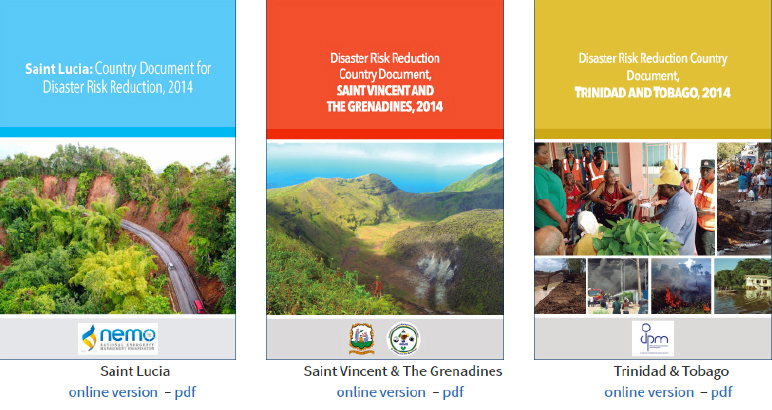Country Documents for DRR strengthen local and national resilience in the Caribbean are now available online
24 de febrero 2017
 Disaster Risk Reduction Priorities for the Caribbean Report.
Disaster Risk Reduction Priorities for the Caribbean Report.
By: UNISDR – The Americas
PANAMA, Panama, 24 February, 2017 – The Country Documents for Disaster Risk Reduction (DRR) for Barbados, Dominica, Dominican Republic, Grenada, Guyana, Jamaica, Saint Lucia, Saint Vincent and the Grenadines, and Trinidad & Tobago are now available online. The Country Document is an essential tool that provides a comprehensive overview of DRR in a country and the online version will now facilitate access to DRR relevant information and allow countries to update the content of the document in real time.
For several countries the document guides country representatives and governmental entities that have access to up-to-date information on DRR tailored to the country's specific needs, thus improving their DRR policy and decision-making to avoid the generation of new and reduces existing risks and strengthen resilience.
In Barbados for example, since the development of the Country Document in 2014, it has been used to inform DRR related project proposals and submissions. It further served as basis for experts and institutions conducting research, and has sensitized national level stakeholders, organizations, members of the public and members from Barbados' Department of Emergency Management (DEM) Advisory Council. The Country Document for Barbados has also been useful to highlight the nexus between DRR, Climate Change and Sustainable Development within the national and international context. Most recently the document was used by DEM to inform the revision of the disaster management section in the upcoming updated version of the Barbados' Growth and Development Strategy.
In Jamaica, the Country Document has been utilized in development of policies of the Office for Disaster Preparedness and Emergency Management (ODPEM). Information from the Country Document has been used in corporate strategic and operation plans. Indirectly, the document supports the Standard Operating Procedures, with particular use in the development of the Marine Resource and Chemical Management Plan.
Further south, in Guyana the Country Document currently serves as a base document on the status of the country's DRR and its integration into plans and policies for Ministries as well as the private sector. Based on the Country Document, staff of the Civil Defense Commission identified gaps in disaster risk management in Guyana. The acknowledgement of these gaps in Guyana fuelled, among other initiatives, The Community Based Disaster Risk Management for a number of communities.
In Saint Lucia, the Country Document is utilized to guide the implementation of new initiatives, set objectives and set the agenda for DRR at the national level. Currently the Disaster Management Policy and the Water Management Plan for Drought conditions are being reviewed and updated with the Country Document as the focus for the work of the National Disaster Emergency Organization.
In Saint Vincent and the Grenadines, the staff of the National Emergency Management Organization (NEMO) has been utilizing the document to support their work which has sparked a particular interest in the historical records of disasters in the country, consequently, when new persons join the organization, the document provides an in-depth assessment of the DRR environment of the country.
Prior to the development of the DRR Country Document, Trinidad & Tobago's Office for Disaster Preparedness and Management (ODPM) did not have an up-to-date comprehensive repository of the DRR landscape. In Trinidad and Tobago the Country Document is used by the organization as a baseline for assessing the status of programmes, policies and plans contained therein.
Ricardo Mena, head of the UNISDR regional Office for the Americas highlights that these examples demonstrate that the Country Documents for Disaster Risk Reduction indeed serve as national reference for policy design and decision making for interventions for DRR as well as to provide support in the planning and coordination of activities with cooperation entities. It further underlines the importance of leadership by the national system to ensure follow-up and buy-in by diverse stakeholders, in particular those involved in sustainable development activities.
This development of the country documents as well as its online version was possible thanks to the support by the European Commission's Humanitarian Aid and Civil Protection department (ECHO) from 2012 to the beginning of 2017. This initiative forms part of the many projects focusing on the integral management of disaster risk, that have been supported by ECHO in the Caribbean region since 1994.Technical support for the development of Country Documents in the Caribbean was provided by the United Nations Office for Disaster Risk Reduction (UNISDR).
Related Links:
Country Documents for Disaster Risk Reduction – online version
UNISDR Regional Office for the Americas
ECHO



